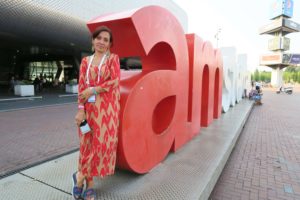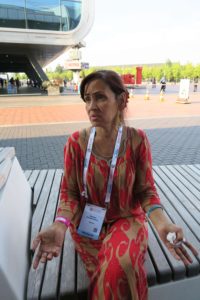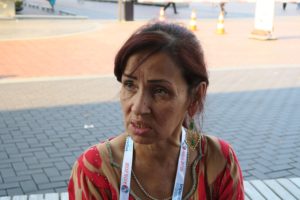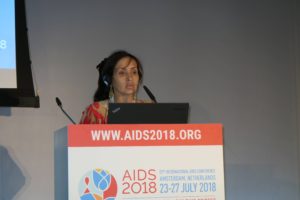 Author: Nargis Hamrabaeva, Tajikistan
Author: Nargis Hamrabaeva, Tajikistan
Fifty-year-old Zebo from a southern region of Tajikistan – Khatlon – is a former labour migrant. At the 22nd International AIDS Conference in Amsterdam (AIDS 2018), she had the courage to speak out about what she long kept in – her HIV-positive status. Zebo once again turned the attention of the international community to the fact that labour migrants are one of the populations most vulnerable to HIV.
We interviewed her in Amsterdam, right after she delivered a speech at one of the sessions dedicated to HIV in the context of labour migration.
– Zebo, why did you decide to go to Russia to earn money? Usually that is what men do.
– In 2004, after I divorced my husband, I was left alone with three small children – my elder siblings were 9 and 6 years old, and my smallest daughter was only 3 months old. I worked as a nurse at a local maternity clinic. My children grew up, with our expenses growing along the way, and my earnings were not enough to feed them all. My ex-husband had a new family and was not helping us. Many of my countrymen went abroad to earn money and support their families. I decided to do the same. That is how my children and I found our way to Saint Petersburg.
 – Isn’t it difficult for a woman to be a labour migrant?
– Isn’t it difficult for a woman to be a labour migrant?
– It is very difficult. I was desperate and went to nowhere. For the first days, we slept at the railway station or in the street. Some strangers helped us, offering food or money. Once, a woman from Tajikistan, who worked in Saint Petersburg, saw us and was so kind to give shelter to my children and me. I started baking and selling pasties, earned some money. As time passed, more people were buying our pasties: I was baking and my elder daughter was selling them at the Sadovy street market. Luckily, we had many buyers. However, I had to work my fingers to the bone.
I tried to settle my personal life again as it was very hard for me to cope with all my troubles alone. I met a young man. In the beginning, everything was fine. Then I started noticing him doing some strange things. It turned out that he was a drug user. He injected drugs. I asked him to stop but it did not help. Then I decided to break up with him. Later I heard that he felt bad and his relatives took him back to his motherland. Since then, I have never heard from this man, but my HIV status always reminds me of him.
– When did you first learn that you had HIV?
– In 2015, a year after I broke up with my partner. All of a sudden, I felt bad and had a fever. My relatives called an ambulance. In the hospital, they made some tests and I was diagnosed with HIV. In a month, I felt better and went back home, but six months later it happened again. I was dwindling, with my weight going down to 34 kilos. Doctors advised me to go back to my country and get treatment. Almost all my countrymen working in Saint Petersburg had to raise money to buy airline tickets for me and my children. They knew that I was severely ill but did not know the exact diagnosis. When I came home, my family knew I had HIV. They did not really welcome me back. My relatives turned their backs on me and asked me to leave our house. My mother said that I would infect everyone, told people not to eat from the same plate with me and not to shake hands with me. I remember her yelling: “Get out of the house, aidsy!” It hurt me to hear such words, especially from my own mother. Still there are kind people in this world, so a neighbour living opposite from my parent’s house offered me to stay with her. She gave me a small room in a little building. That is where I still live.
 – So you had to go back to square one again?
– So you had to go back to square one again?
– Yes, I did. A woman I know told me about AFEW-Tajikistan office in Bokhtar. I went there and they received me well, helping with food and treatment. They also had a business workshop for the members of vulnerable populations and I was able to get a credit from a microfinance organization. I bought everything I needed to open a small sales outlet in the neighbourhood. Sometimes, when I need to go to the city, my daughter takes over my duties. Children always help and support me in everything I do. My son also assists street market vendors, bringing home 15 somoni a day (less than two US dollars – ed. note). After my speech at the Amsterdam conference, Director of AFEW-Tajikistan Ikrom Ibragimov offered me to work as a consultant in the Bokhtar office of the organization. Now I will receive a salary. I am so grateful to him and to all the members of his great team. With their support, my life is getting better.
 – Great! One more question about Amsterdam. What does participation in the AIDS conference mean to you?
– Great! One more question about Amsterdam. What does participation in the AIDS conference mean to you?
– It is my first trip far abroad. It is also the first time I take part in such a conference. I listened to many speakers and was inspired by their stories. They were openly saying that they lived with HIV for 20-25 years, taking care of their health and living active and complete lives. It gave me strength and confidence. I was startled to learn that in many countries people living with HIV are not prosecuted and other people do not avoid them. In those several days of the conference, I received more sincere hugs and handshakes than I did since I learned about my diagnosis. Why is there such a strong stigma against people living with HIV in my country? Why do people still hold to stereotypes and are afraid of us? At one of the sessions of the Amsterdam conference, I heard a slogan: “Chase the virus, not people.” It is such a good point!



